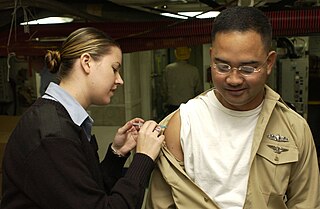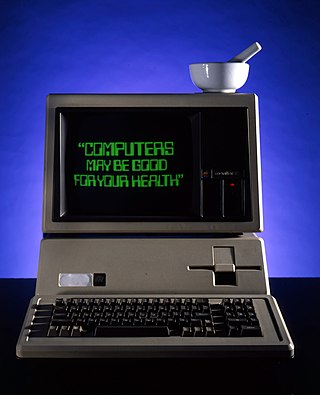
Influenza vaccines, colloquially known as flu shots, are vaccines that protect against infection by influenza viruses. New versions of the vaccines are developed twice a year, as the influenza virus rapidly changes. While their effectiveness varies from year to year, most provide modest to high protection against influenza. Vaccination against influenza began in the 1930s, with large-scale availability in the United States beginning in 1945.

Vaccine hesitancy is a delay in acceptance, or refusal, of vaccines despite the availability of vaccine services and supporting evidence. The term covers refusals to vaccinate, delaying vaccines, accepting vaccines but remaining uncertain about their use, or using certain vaccines but not others. Although adverse effects associated with vaccines are occasionally observed, the scientific consensus that vaccines are generally safe and effective is overwhelming. Vaccine hesitancy often results in disease outbreaks and deaths from vaccine-preventable diseases. Therefore, the World Health Organization characterizes vaccine hesitancy as one of the top ten global health threats.
Public health surveillance is, according to the World Health Organization (WHO), "the continuous, systematic collection, analysis and interpretation of health-related data needed for the planning, implementation, and evaluation of public health practice." Public health surveillance may be used to track emerging health-related issues at an early stage and find active solutions in a timely manner. Surveillance systems are generally called upon to provide information regarding when and where health problems are occurring and who is affected.
Pox parties, also known as flu parties, are social activities in which children are deliberately exposed to infectious diseases such as chickenpox. Such parties originated to "get it over with" before vaccines were available for a particular illness or because childhood infection might be less severe than infection during adulthood, according to proponents. For example, measles is more dangerous to adults than to children over five years old. Deliberately exposing people to diseases has since been discouraged by public health officials in favor of vaccination, which has caused a decline in the practice of pox parties, although flu parties saw a resurgence in the early 2010s.
The National Vaccine Information Center (NVIC), founded under the name Dissatisfied Parents Together (DPT) in 1982, is an American 501(c)(3) organization that has been widely criticized as a leading source of fearmongering and misinformation about vaccines. While NVIC describes itself as the "oldest and largest consumer-led organization advocating for the institution of vaccine safety and informed consent protections", it promotes false and misleading information including the discredited claim that vaccines cause autism, and its campaigns portray vaccination as risky, encouraging people to consider "alternatives." In April 2020, the organization was identified as one of the greatest disseminators of COVID-19 misinformation on Facebook.

A vaccination schedule is a series of vaccinations, including the timing of all doses, which may be either recommended or compulsory, depending on the country of residence. A vaccine is an antigenic preparation used to produce active immunity to a disease, in order to prevent or reduce the effects of infection by any natural or "wild" pathogen. Vaccines go through multiple phases of trials to ensure safety and effectiveness.

Keith Russell Ablow is an American author, television personality, and former psychiatrist. He is a former contributor for Fox News Channel and TheBlaze.

Lori Swanson is an American lawyer and politician who served as the attorney general of Minnesota from 2007 to 2019. She was the first female attorney general elected in Minnesota. In 2018, she ran for Governor of Minnesota with running mate U.S. Representative Rick Nolan finishing in third place in the Democratic-Farmer-Labor primary.
A vaccination policy is a health policy adopted in order to prevent the spread of infectious disease. These policies are generally put into place by state or local governments, but may also be set by private facilities, such as workplaces or schools. Many policies have been developed and implemented since vaccines were first made widely available.

The 2009 swine flu pandemic was a global outbreak of a new strain of influenza A virus subtype H1N1, first identified in April 2009, termed Pandemic H1N1/09 virus by the World Health Organization (WHO) and colloquially called swine flu. The outbreak was first observed in Mexico, and quickly spread globally. On 11 June 2009, the WHO declared the outbreak to be a pandemic. The overwhelming majority of patients experienced mild symptoms, but some persons were in higher risk groups, such as those with asthma, diabetes, obesity, heart disease, who were pregnant or had a weakened immune system. In the rare severe cases, around 3–5 days after symptoms manifest, the sufferer's condition declines quickly, often to the point of respiratory failure.
The Medicare Sustainable Growth Rate (SGR) was a method used by the Centers for Medicare and Medicaid Services (CMS) in the United States to control spending by Medicare on physician services.
Healthgrades Marketplace, LLC, known as Healthgrades, is a US company that provides information about physicians, hospitals, and healthcare providers. Healthgrades is part of RVO Health, a partnership between Red Ventures and Optum, part of UnitedHealth Group. Healthgrades has amassed information on over three million U.S. health care providers. The company was founded by Kerry Hicks, David Hicks, Peter Fatianow, John Neal, and Sarah Lochran, and is based in Denver, Colorado. Jeff Hallock serves as RVO Health's CEO. According to USA Today, Healthgrades is the first comprehensive physician rating and comparison database. The application is part of a trend in health technology in the United States towards consumer-driven healthcare.

Kevin Pho is an American physician of internal medicine, media commentator, public speaker, and author. He is the founder and editor of KevinMD.com, a website aimed at medical professionals.

The Wikipedia online encyclopedia has, since the late 2000s, served as a popular source for health information for both laypersons and, in many cases, health care practitioners. Health-related articles on Wikipedia are popularly accessed as results from search engines, which frequently deliver links to Wikipedia articles. Independent assessments have been made of the number and demographics of people who seek health information on Wikipedia, the scope of health information on Wikipedia, and the quality and reliability of the information on Wikipedia.
Robert William Sears, known as Dr. Bob, is an American pediatrician from Capistrano Beach, California, noted for his unorthodox and dangerous views on childhood vaccination. While Sears acknowledges the efficacy of vaccines—for instance, he supports the claim that Chicken pox, measles, whooping cough, polio, diphtheria have all disappeared because of vaccines—he has proposed alternative vaccination schedules that depart from accepted medical recommendations. His proposals have enjoyed celebrity endorsement but are not supported by medical evidence and have contributed to dangerous under-vaccination in the national child population. While he denies being anti-vaccine, Sears has been described by many as anti-vaccine and as a vaccine delayer.

Roni F. Zeiger is an American physician and technologist. He is notable for his work as the Chief Health Strategist (2006–2012) at Google where he developed Google Health and Google Flu Trends. He is a co-founder of the Smart Patients project. In 2019, Zeiger announced he would be joining Facebook as the Head of Health Strategy.

Health information on the Internet refers to all health-related information communicated through or available on the Internet.

Susan Anderson was an American physician and one of the first women to practice medicine in Colorado.
Helen Y. Chu is an American immunologist who is an assistant professor of medicine at the University of Washington. Her research considers maternal immunization, with a focus on influenza and respiratory syncytial virus. During the COVID-19 pandemic, Chu was the first physician to recognise community transmission of the coronavirus disease within the United States.











